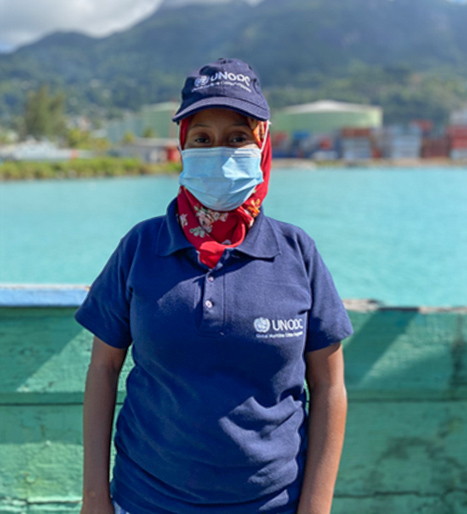UNODC Eastern Africa News and Stories
You are here: Home / News
Women in Security: Securing the Somali Coast Line
 Somalia, 2 July 2021 - With the longest coastline on the continent, Somalia is endowed with vast marine resources, which if properly harnessed can greatly contribute to the socioeconomic growth of Somalia. However, insecurity and maritime crimes have undermined the potential for these resources to contribute to the country’s growth.
Somalia, 2 July 2021 - With the longest coastline on the continent, Somalia is endowed with vast marine resources, which if properly harnessed can greatly contribute to the socioeconomic growth of Somalia. However, insecurity and maritime crimes have undermined the potential for these resources to contribute to the country’s growth.
To address the insecurities and create a conducive environment for these marine resources to spar growth in Somalia, the UNODC though the Global Maritime Crime Programme (GMCP), supports the maritime law enforcement agencies at major Somali ports including Berbera, Bossaso and Mogadishu. The GMCP interventions include capacity building for the security personnel and efforts to disrupt terrorist financing from maritime flows, which undermine the country’s rule of law, peace, and stability. Since 2018, UNODC GMCP has extended its support to include building the capacity of the Galmudug Maritime Police Unit (GMPU), an initiative that has been well received by the Galmudug authorities.
In the months of May and June 2021, UNODC delivered two trainings to 7 Galmudug maritime Police Unit Officers. One training was on Seamanship for seven (7) officers, and the other was a two-week Visit, Board, Search and Seizure (VBSS) training for the same seven (7) officers from Galmudug MPU, including 2 female officers. The training provided the participants live experiences on a Dhow boat focusing on Covid-19 safety, maritime interception operations, defence skills, boarding and safety inspection procedures, search techniques, basic investigation practice, among others. The depth of knowledge in the theory and practice were provided through Table-Top Exercises (TTX) to conduct patrols on the water more effectively.
Ms. Asha Mohamud Ali is one of the female trainees. Ms Asha talked about the importance of the opportunity given to her. She said that the training exposed them to different technologies, which strengthened their operational capacity. "Due to these trainings, we can use technologies and equipment that is not available in Somalia like the high-tech boats we have here. We can also see the differences between different marine navigation ships".
Due to the concerted efforts to increase women representation, there has been an increase in female members in Somali law enforcement. According to the United Nations Sustainable Development Goal 5 (SDG5), significant progress has been made towards eliminating discrimination against women seeking to enter male-dominated occupations. Asha stated, “Previously, women did not want to join the workforce as they used to encounter a lot of challenges. There are many reasons behind this; a misconception that females are intellectually, physically, and emotionally incapable of doing the work compared to their male counterparts”. She added, “Due to patriarchal structures in the society, women have been subordinated along gender roles. They have been denied opportunities traditionally believed to belong to the male counterparts. However, women are increasingly taking action and applying for occupations traditionally held by males."
Somali maritime enforcement agencies are advancing gender equality and supporting women in the security sector. While security forces are male dominated in many countries, Asha, one of the female participants, recognised that those patriarchal barriers for women are bygones and more opportunities in recruitment and training are available for both genders. She stated, "Females and males are assigned same responsibilities, indicating that there is little difference in their eligibility criteria to join the police." Also, as a private commander officer, she can participate in training, including the UNODC capacity building programme, to strengthen the operational and strategic capacity to fulfil the duty as maritime law enforcement officer to secure her country. She highlighted that "I cannot wait to share what I have learnt with my colleagues back in Somalia."
UNODC will continue providing the necessary support to enhance the maritime security response in Somalia. Furthermore, pursuant to its mandate under the United Nations Security Council Resolution 2551/20, UNODC through the GMCP is working towards disrupting the maritime flows especially those related to the flow of sugar that contribute to terrorism financing. Fisheries crime has become another area of intervention by the UNODC through GMCP as indicators point to increased incidents of illegal fishing within the Somali’s territorial waters. It is estimated that the total economic value of domestic fisheries, after value is added through the supply chain, to be US$135 million per year” although the presence of IUU has undermined the possibility for the country to tap on these resources. Additionally, IUU fishing has extremely destructive impacts on the environment, which in turn affects the livelihoods of coastal communities that rely on the marine resources. The issue has been widely discussed in Somalia and has become imperative for MLE Officers to respond to this issue. Asha highlighted the urgency to tackle illegal fishing and her desire to partake on those efforts. She averred, “I enjoy fighting for my nation and protecting the Somali waters from illegal fishing practices, one of the most severe dangers to our ocean."